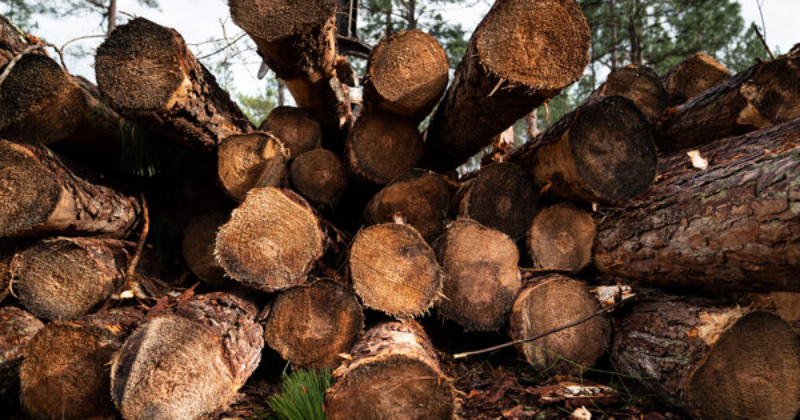The European Union’s race to rid itself of dependence on Russian fossil fuels is well underway. The International Energy Agency says widespread bids to beef up energy security “turbocharged” growth of green power in 2022, and EU parliamentarians hope to ramp up renewables targets to reach 45% of bloc-wide energy consumption by 2030.
The word “renewable” often conjures up images of wind farms or solar panels — less so scenes of burning trees. But Biomass, which includes firewood, plants and other organic materials, makes up 60% of the EU’s renewable energy mix according to the European Commission. As the bloc now reviews its landmark renewable power legislation, a political battle over firewood’s future is playing out in Brussels.

Greenbiz
Jump To
![]()
EU Accused Of Incentivizing Environmental Harm
Because new trees can be planted after others have been chopped down, firewood gets the renewable seal of approval under EU law. That means member countries can subsidize wood burning, as long as certain sustainable sourcing rules are met.
But Martin Pigeon of Brussels-based forest protection campaign group Fern argues the subsidy setup is “insane” as it means “EU citizens are paying energy companies to burn forests in the midst of a climate and biodiversity crisis.”
Industry groups refute these claims. Bioenergy Europe is a Brussels-based nonprofit focused on raising “awareness, acceptance and reputation of bioenergy.” The organization represents more than 150 energy companies and 40 associations — and Policy Officer Irene Di Padua said in written comments that responsibly sourced biomass “is essential for the EU’s green transition, especially in providing renewable heat.”
“Bioenergy needs to comply with strict sustainability criteria that ensure sourcing and use of biomass for energy does not cause any environmental harm or biodiversity loss,” she said.
Martin Pigeon, however, argues that those criteria are “not strict.”
Climate Impact Of Wood-Burning Under Debate
The climate impact of wood-burning is contested. The EU officially counts wood and other biomass as carbon neutral, based on the premise that CO2 emitted through burning will be reabsorbed by more trees in the future. But the European Academies Science Advisory Council says scientific study suggests the trend to replace coal with wood pellets as a means of generating electricity actually increases “atmospheric levels of carbon dioxide for substantial periods of time.”
A 2019 EASAC report says the time it takes for carbon emissions associated with woodburning to be evened out can range from years to decades or even centuries, depending on conditions.

The New York Times
EU Institutional Showdown Over Future Of Firewood Subsidies
The European Parliament wants to limit subsidies for burning wood taken directly from forests, and instead restrict state support to secondary wood products like sawdust. Lawmakers also want to phase down the amount of wood that counts toward EU renewable energy targets.
Nils Torvalds, one of the lawmakers working on the legislation, said the proposal is “the parliament’s way of trying to limit the unsustainable and inefficient use” of wood.
But Eurelectric, an industry group representing national electricity associations and major electricity companies across Europe, said that the European Parliament proposals would “disturb the practicalities of forest management, lead to further supply shortages of sustainable biomass, and thus impair energy security and increase prices.”
In a 2022 letter to EU member states, Eurelectric also argued that the suggestion to restrict subsidies could result in some wood excluded from support under proposals, to decompose on forest floors. “This causes CO2 emissions but yields no energy,” the group said.
EU member states, meanwhile, prefer a looser definition of which type of wood can be subsidized. Diplomats said “there’s a feeling that with Russia’s invasion of Ukraine, with the energy crisis, member states do think that bioenergy is an important renewable source of energy. It has an important contribution to the energy system and to reaching the climate goals.”
Negotiations on the details of the legislation continue this month.
European Commission Promises Tighter Forest Sustainability Rules
The European Commission has also put forward plans to tighten laws on which firewood qualifies for subsidies. A spokesperson said that proposals include barring wood sourced from ancient forests, and only greenlighting state support for lumber from “highly biodiverse forests when there’s no interference with nature protection purposes.”
Under the plans, all wood-burning power plants will also have to meet certain greenhouse gas saving thresholds.
But the track record on existing rules leaves room for concern. National authorities are supposed to transpose EU standards into domestic legislation, but the European Commission spokesperson said that the body launched legal action against all 27 member states in 2021 for failing to complete this process or failing to notify Brussels of completion.
“We are closely monitoring this process and stand ready to take enforcement actions, if needed,” the spokesperson said.


